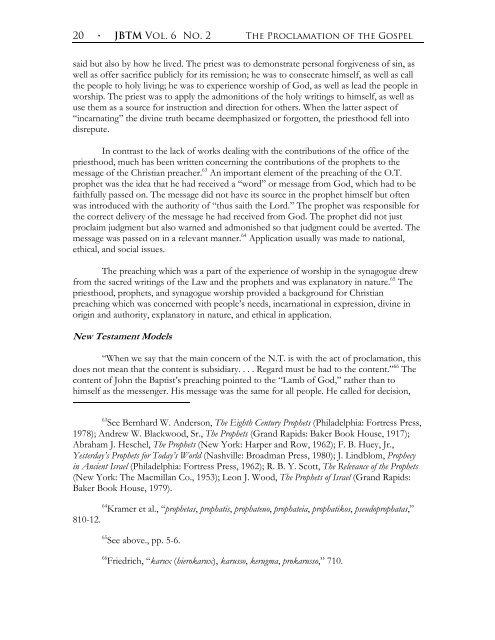0 jbtm vol. 6, no. 2 the proclamation of the gospel - Baptist Center for ...
0 jbtm vol. 6, no. 2 the proclamation of the gospel - Baptist Center for ...
0 jbtm vol. 6, no. 2 the proclamation of the gospel - Baptist Center for ...
You also want an ePaper? Increase the reach of your titles
YUMPU automatically turns print PDFs into web optimized ePapers that Google loves.
20 ٠ JBTM Vol. 6 No. 2 The Proclamation <strong>of</strong> <strong>the</strong> Gospel<br />
said but also by how he lived. The priest was to demonstrate personal <strong>for</strong>giveness <strong>of</strong> sin, as<br />
well as <strong>of</strong>fer sacrifice publicly <strong>for</strong> its remission; he was to consecrate himself, as well as call<br />
<strong>the</strong> people to holy living; he was to experience worship <strong>of</strong> God, as well as lead <strong>the</strong> people in<br />
worship. The priest was to apply <strong>the</strong> admonitions <strong>of</strong> <strong>the</strong> holy writings to himself, as well as<br />
use <strong>the</strong>m as a source <strong>for</strong> instruction and direction <strong>for</strong> o<strong>the</strong>rs. When <strong>the</strong> latter aspect <strong>of</strong><br />
“incarnating” <strong>the</strong> divine truth became deemphasized or <strong>for</strong>gotten, <strong>the</strong> priesthood fell into<br />
disrepute.<br />
In contrast to <strong>the</strong> lack <strong>of</strong> works dealing with <strong>the</strong> contributions <strong>of</strong> <strong>the</strong> <strong>of</strong>fice <strong>of</strong> <strong>the</strong><br />
priesthood, much has been written concerning <strong>the</strong> contributions <strong>of</strong> <strong>the</strong> prophets to <strong>the</strong><br />
message <strong>of</strong> <strong>the</strong> Christian preacher. 63 An important element <strong>of</strong> <strong>the</strong> preaching <strong>of</strong> <strong>the</strong> O.T.<br />
prophet was <strong>the</strong> idea that he had received a “word” or message from God, which had to be<br />
faithfully passed on. The message did <strong>no</strong>t have its source in <strong>the</strong> prophet himself but <strong>of</strong>ten<br />
was introduced with <strong>the</strong> authority <strong>of</strong> “thus saith <strong>the</strong> Lord.” The prophet was responsible <strong>for</strong><br />
<strong>the</strong> correct delivery <strong>of</strong> <strong>the</strong> message he had received from God. The prophet did <strong>no</strong>t just<br />
proclaim judgment but also warned and admonished so that judgment could be averted. The<br />
message was passed on in a relevant manner. 64 Application usually was made to national,<br />
ethical, and social issues.<br />
The preaching which was a part <strong>of</strong> <strong>the</strong> experience <strong>of</strong> worship in <strong>the</strong> synagogue drew<br />
from <strong>the</strong> sacred writings <strong>of</strong> <strong>the</strong> Law and <strong>the</strong> prophets and was explanatory in nature. 65 The<br />
priesthood, prophets, and synagogue worship provided a background <strong>for</strong> Christian<br />
preaching which was concerned with people’s needs, incarnational in expression, divine in<br />
origin and authority, explanatory in nature, and ethical in application.<br />
New Testament Models<br />
“When we say that <strong>the</strong> main concern <strong>of</strong> <strong>the</strong> N.T. is with <strong>the</strong> act <strong>of</strong> <strong>proclamation</strong>, this<br />
does <strong>no</strong>t mean that <strong>the</strong> content is subsidiary. . . . Regard must be had to <strong>the</strong> content.” 66 The<br />
content <strong>of</strong> John <strong>the</strong> <strong>Baptist</strong>’s preaching pointed to <strong>the</strong> “Lamb <strong>of</strong> God,” ra<strong>the</strong>r than to<br />
himself as <strong>the</strong> messenger. His message was <strong>the</strong> same <strong>for</strong> all people. He called <strong>for</strong> decision,<br />
63 See Bernhard W. Anderson, The Eighth Century Prophets (Philadelphia: Fortress Press,<br />
1978); Andrew W. Blackwood, Sr., The Prophets (Grand Rapids: Baker Book House, 1917);<br />
Abraham J. Heschel, The Prophets (New York: Harper and Row, 1962); F. B. Huey, Jr.,<br />
Yesterday’s Prophets <strong>for</strong> Today’s World (Nashville: Broadman Press, 1980); J. Lindblom, Prophecy<br />
in Ancient Israel (Philadelphia: Fortress Press, 1962); R. B. Y. Scott, The Relevance <strong>of</strong> <strong>the</strong> Prophets<br />
(New York: The Macmillan Co., 1953); Leon J. Wood, The Prophets <strong>of</strong> Israel (Grand Rapids:<br />
Baker Book House, 1979).<br />
810-12.<br />
64 Kramer et al., “prophetas, prophatis, prophateuo, prophateia, prophatikos, pseudoprophatas,”<br />
65 See above., pp. 5-6.<br />
66 Friedrich, “karux (hierokarux), karusso, kerugma, prokarusso,” 710.


